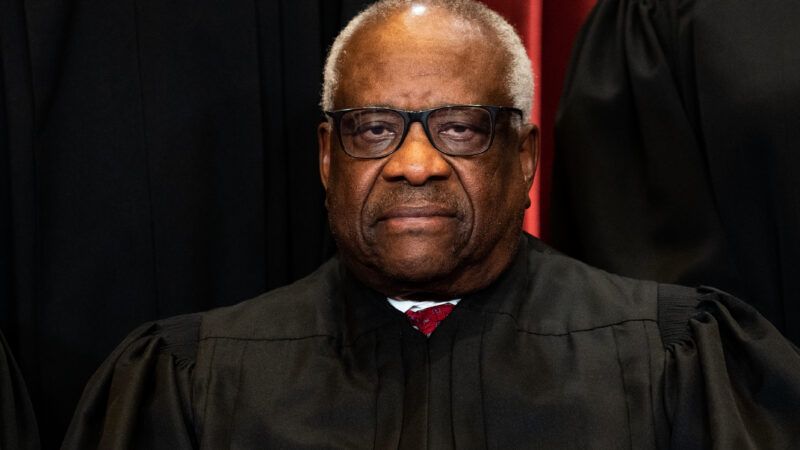The Laissez Faire Origins of the Supreme Court's Abortion Precedents
“All of those…just come out of Lochner.”

Historians sometimes refer to the U.S. Supreme Court's early 20th century jurisprudence as an era of "laissez faire constitutionalism." They are referring in particular to Lochner v. New York, the 1905 case in which the Court struck down a state law that set maximum working hours for bakery employees on the grounds that it violated the liberty secured by the Due Process Clause of the 14th Amendment, which says that no state may deprive any person of life, liberty, or property, without due process of law.
Lochner was eventually made a dead letter during the New Deal, when the Supreme Court reversed course and said that because no such conception of liberty was specifically spelled out in the Constitution, the Court would no longer offer any judicial protections for it. A state "regulation which is reasonable in relation to its subject and is adopted in the interests of the community," the Court said in West Coast Hotel Co. v. Parrish (1937), "is due process."
Lochner may be gone, but one of its central legacies—the idea that the 14th Amendment protects a broad conception of liberty against state regulation—does still live on. That fact was clearly illustrated yesterday when the Supreme Court heard oral arguments in Dobbs v. Jackson Women's Health, a case about the legality of a Mississippi law banning abortion after 15 weeks of gestation.
"If I were to ask you what constitutional right protects the right to abortion," Justice Clarence Thomas asked Julie Rikelman, the lawyer representing Jackson Women's Health, "is it privacy? Is it autonomy? What would it be?"
"It's liberty, Your Honor," Rikelman replied. "It's the textual protection in the Fourteenth Amendment that a state can't deprive a person of liberty without due process of law, and the Court has interpreted liberty to include the right to make family decisions and the right to physical autonomy, including the right to end a pre-viability pregnancy." And that interpretation, she continued, stretches back "for over a hundred years in cases going back to Meyer, Griswold, Carey, Loving, Lawrence."
"Yeah," Thomas replied, but "all of those…just come out of Lochner, so we've dropped part of it."
The Supreme Court did (unfortunately) drop Lochner. But Rikelman had a point too. One of the cases she cited was Meyer v. Nebraska (1923), in which the Court invalidated a state law that banned both public and private schools from teaching young children in a foreign language. The law was successfully challenged by a man named Robert Meyer, who taught the Bible in German at a school run by the Zion Evangelical Lutheran Congregation.
"Without doubt," the Supreme Court said in Meyer, the 14th Amendment's guarantee of liberty "denotes not merely freedom from bodily restraint, but also the right of the individual to contract, to engage in any of the common occupations of life, to acquire useful knowledge, to marry, establish a home and bring up children, and generally to enjoy those privileges long recognized at common law as essential to the orderly pursuit of happiness by free men." Among the legal authorities that the Court cited in Meyer in support of that sweepingly libertarian passage was Lochner v. New York.
Two years later, in Pierce v. Society of Sisters (1925), the Court continued the libertarian streak by striking down on 14th Amendment grounds Oregon's Compulsory Education Act, which had forbidden parents from educating their children in private schools. "The child is not the mere creature of the state," the Court declared.
Meyer and Pierce both remain good law today and are both squarely in the Lochner line of cases. And they are a big part of what Rikelman meant when she referenced "the right to make family decisions." Put differently, if a state today tried to thwart the wishes of many parents by outlawing private schools, Pierce would stand fully in the way. That's a legacy of Lochner.
Which brings us to abortion. In Griswold v. Connecticut (1965), the Supreme Court recognized an unenumerated right to privacy and said that a state law which criminalized the use of birth control violated this right. Griswold cited Meyer and Pierce in support of its judgment that married couples have a constitutional right to obtain and use contraceptive devices ("the right to make family decisions"). Roe v. Wade (1973), which recognized abortion rights, both cited and built on the Griswold decision.
In short, as Thomas indicated, there is a line running from Lochner to Roe. The expansive conception of liberty once recognized by the courts in the era of "laissez faire constitutionalism" is still at least partially identifiable today in the Supreme Court's privacy and abortion precedents.


Show Comments (162)